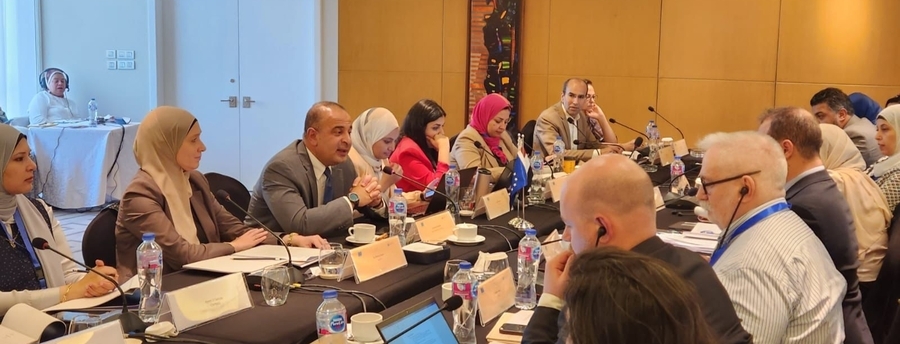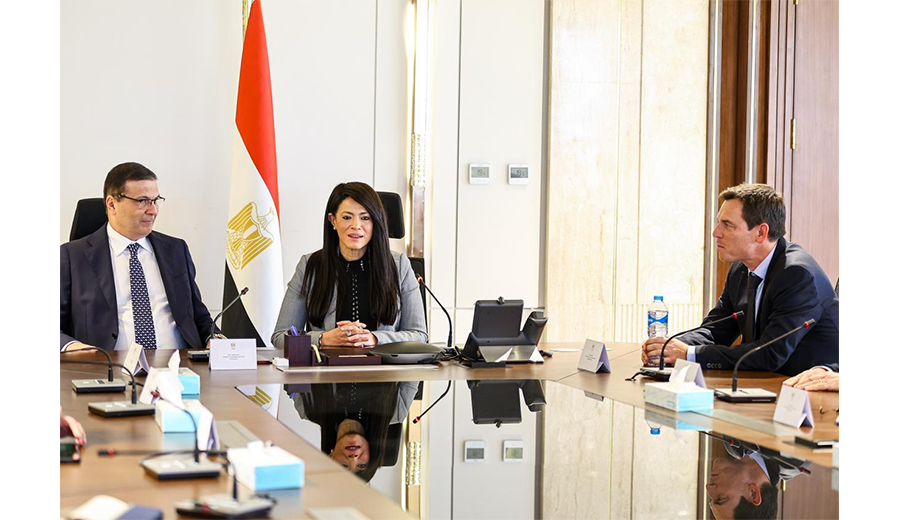The Ministry of Planning and Economic Development Hosts a Workshop Titled, “A Comprehensive Government Approach Towards the Implementation of Egypt's Vision 2030” in Collaboration With the Organization for Economic Cooperation and Development

09 June 2023
The Ministry of Planning and Economic Development (MPED) held a four-day workshop in collaboration with the Organization for Economic Cooperation and Development (OECD) as part of the support of the general governance and economy in Egypt. Attended the first day of the workshop, representatives of the different sectors and units of MPED. It is important to note that the second day is dedicated to representatives of a number of ministries and agencies including Deputy Minister of Planning and Economic Development Dr. Ahmed Kamali.
Assistant Minister of Planning for Sustainable Development Affairs Dr. Mona Essam gave the opening remarks of the workshop in the presence of representatives of the different sectors and units in the ministry, which included the technical office of the Deputy Minister of Planning and Economic Development, the infrastructure sector, the regional planning sector, the human and social development sector, the plan preparation sector, the programs and performance unit, the sustainable development Unit, the strategic planning unit, the communication and strategic partnerships unit, the country program implementation and follow-up unit with the OECD, and the ministry's information office.
During the opening session of the workshop, Dr. Mona Essam indicated that the workshop comes within the framework of the support of the public governance and economy in Egypt executed by the OECD and funded by the European Union (EU) aiming to support the implementation and follow-up of Egypt’s Vision 2030, which means the actual consistency between Egypt's Vision 2030 and all other local and sectoral strategies and plans at all levels and in the long, medium and short term.
Furthermore, Dr. Mona Essam added that the main objective of the workshop is to complete the technical discussions on the different levels of planning in light of the new planning law, as well as the frameworks for implementation, follow-up and evaluation of Egypt's Vision 2030, and to work on networking and integrating the responses of the various sectors and units concerned to the questionnaire prepared by the OECD with the aim of drawing a clear picture of the governance of Egypt Vision 2030 and the annual planning process led by MPED. This questionnaire is a data collection tool to support the review of public governance in Egypt.
Also, the Assistant Minister of Planning for Sustainable Development confirmed that the working sessions within the workshop are an opportunity to exchange and present ideas and discussions about existing mechanisms and procedures for strategic planning as well as follow-up and evaluation within the framework of Egypt's Vision 2030 so that we can coordinate current and future efforts and resources and benefit from them to ensure the integration of the planning and follow-up process. In addition to the possibility of exchanging ideas, experiences, case studies, models, tools and current methodologies in the main areas of the strategic planning process with the OECD countries, with a focus on institutional arrangements, processes and tools to ensure strategic coordination.
During the activities of the second day of the workshop, which were attended by representatives of the Ministries of Finance, Environment, Local Development, Health and Population, the Central Agency for Public Mobilization and Statistics (CAPMAS), the National Council for Childhood and Motherhood, and the National Institute for Governance and Sustainable Development (NIGSD). The importance of coordination and integration between the various national agencies was emphasized in order to adopt an integrated system for development planning, monitoring and evaluation, in addition to effective governance of that system; Which requires the national authorities to work together to establish a strong institutional framework that guarantees networking and continuous and effective communication between all parties at all levels in an institutional and periodic manner. Thus, the second day of the workshop represented an opportunity to exchange ideas and experiences on how to access and analyze detailed and accurate information and data so that the decision-maker can benefit from them in making decisions and establishing evidence-based and gender-responsive planning, in addition to drawing policies and developing strategies that respond to the needs of the citizen and providing good services for him/her.
During the closing session of the second day, Deputy Minister of Planning and Economic Development Dr. Ahmed Kamali stressed the importance of reaching many specific and clear recommendations that can be applied in the Egyptian context and that facilitate the implementation and the follow-up of the implementation of Egypt's Vision 2030, and support the process of public and economic governance, pointing to the possible benefit from the best practices of other countries. Likewise, Dr. Ahmed Kamali emphasized the importance of determining the type of data required and relevant indicators, and the possibility of harmonizing such data with each other.
Moreover, the activities of the third and fourth days of the workshop included training to enhance the comprehensive governmental strategic planning for Egypt's Vision 2030 and the related decision-making processes with the aim of strengthening the capacities of the relevant sectors and units within the MPED with regard to enabling them to strategically plan, implementing and following up Egypt's Vision 2030 and standing on the importance of coordination and effective communication between different sectors and units within the ministry and with various ministries, agencies and government agencies to achieve the desired goal. In addition, the training also dealt with many current tools, methodologies and models related to the main areas of the strategic planning process, along with the presentation of the best practices that can be used in this field in order to move forward to achieve Egypt's Vision 2030 and improve the standard of living of the Egyptian citizen.









